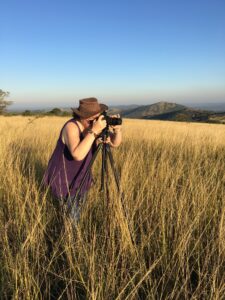In this deeply moving interview, we sit down with Sarah Blakely, a poet whose work has resonated with many who have experienced trauma and healing. With a journey that began in childhood, her poetry has evolved from simple acrostics to powerful reflections on personal pain and recovery. Her books, Volcano Girl and Scarlet & Shadows, explore themes of trauma, mythology, and the healing power of connection. Through her writing, she not only processes her own experiences but also offers solace and understanding to those who share similar stories. In this conversation, Sarah opens up about the challenges of self-publishing, the role of social media in building a community, and the emotional journey behind each poem.
1. Can you share the story behind your journey as a poet? What first inspired you to write poetry?
I started writing poetry very young, so I’m not exactly sure what first inspired me to write. My grandmother gave me my first book of poems by a young girl named Laura Ranger, so I guess that is what started it for me. I was probably 8 or 9 at the time, so that was my first real exposure to poetry. At first, I think I started writing poetry to prove to myself that I could do it too. My first poems were very basic acrostics, rhyming couplets, and things like that. In high school, I wrote poems in the form of songs, and they got more intense after my first experiences with sexual trauma. Much later on, in college, I was taking a poetry course as an elective, and my professor assigned us to read “The Narcissus Flower” by Rita Dove. That was the first time I ever read a poem that spoke to me. I remember crying so hard as I read that poem, and I think that’s when I started writing more trauma poetry. That poem inspired me so much. It made me realize that it’s okay to talk about these things, and it’s okay to write about them too.
2. What specific experiences influenced the themes and content of your poetry books, Volcano Girl and Scarlet & Shadows?
Volcano Girl and Scarlet & Shadows are two different yet similar books. Volcano Girl is more of a memoir-type book of poetry, featuring poems I had written from about 2010 to 2021. It details more specific memories of trauma from my own life, starting from when I was 13. A lot of the poems in Volcano Girl have reflections of Greek myth throughout the poems as well, which I attribute to a mythology course I took in college (and my long-time fascination with mythology) while I was taking a poetry course in the same term. The two kind of collided and produced some of the poems that ended up in Volcano Girl.
Scarlet & Shadows is less specific in terms of experiences that inspired it, but I feel it has more anger. The poems in this collection were mostly written between 2020-2023, so I feel it’s less of a metamorphosis reading experience.
3. How has writing about your experiences with sexual trauma helped in your healing process?
Writing about my traumas has been infinitely helpful to my healing. A lot of the poems that ended up in Volcano Girl were literally written right after EMDR therapy sessions when I would dig into an old wound. So the trauma would be fresh in my mind and the EMDR was having its own effect of processing my trauma, but then writing poetry about the trauma and my experiences had its own level of healing that kind of coincided with my EMDR processing. For a long time, writing poetry was something I did on my own and I never shared my poems with anyone. But when the pandemic started, around 2021 I started sharing my trauma poetry on Instagram and I realized that there were a lot of other people out there who had suffered in similar ways. So sharing my poetry became another form of healing in addition to the writing process because by sharing my writing, I was connecting to other survivors.
4. What message do you hope readers take away from your poetry?
The main message I want my readers to take away is that they’re not alone in their suffering. It’s really unfortunate that there are so many survivors of trauma in the world, but in another way, it’s a strength, because there is power in numbers. When survivors build a network of connections with other survivors, that’s where the power of healing is. Realizing you aren’t alone in something is so incredibly healing on its own.
5. Can you describe the creative process behind your upcoming third poetry book? How does it differ from your previous works?
My next book has been a very different process from my previous collections. My first two books came together kind of on their own, without a lot of effort. They just happened naturally. This next book came to me as an idea in November of 2022 and it’s been a challenge for me because it’s taken significantly more effort. But it’s also been a really fun process. For this book, I’m sticking to a pretty consistent “ocean” inspired theme, so I’ve taken a lot of inspiration from a marine biology course I took, and from little moments and observations from my many trips to the beach. It’s still a trauma collection, but the imagery is consistent with the ocean and its creatures.
6. What challenges have you faced in self-publishing your books, and how did you overcome them?
The inner critic and imposter syndrome is a huge challenge with self-publishing. I always feel like “am I really good enough for this?” or “is this poem good enough?” and I have to keep reminding myself that the doubt I feel is normal. I just have to push through it and do it though. I had a LOT of fear around self-publishing my first collection. It’s extremely vulnerable poetry, and putting your poetry out there is already a vulnerable experience. It felt really uncomfortable for me, but I was determined to do it. When it gets close to publishing day, like a couple of weeks before release, I always have to put the work away and not look at it for months. I can get a little obsessive over little details and it gets really overwhelming when publishing day is coming up, so I just have to let go and let the book out into the world as it is at some point. Promoting my books is another thing that’s been a challenge for me. I hate being that person who’s always saying “buy my book!” and I still probably don’t promote my work enough, but I don’t really care if you buy my books or not. I mean, I’d like you to, sure. If they’re meant to find you, they will.
7. How do you balance the emotional intensity of writing about trauma with self-care?
I don’t force myself to write if it doesn’t feel right. If I’m particularly triggered by something and I still want to write about it, I don’t force myself to write in that moment of feeling triggered. I usually will let myself recover from the trigger and then write about it later. I keep a note on my phone of poetry ideas and lines that come to me, so I’ll jot something in there when I think of it, but then I’ll leave it for later.
After writing a particularly emotional poem, I give myself lots of time to rest and feel. I allow myself to cry if I need to. I take naps. Sometimes I feel a lot better after a nap and a good cry. I tend to dissociate when triggered too, so I try to bring myself back into the present moment as much as I can. Grounding techniques and having something to physically hold onto really help me.
8. Who are some of your literary influences or favorite poets, and how have they shaped your writing?
I didn’t really begin to read or study famous poets until college, so I think a lot of my writing was shaped more by the music and songwriters I listened to. I grew up listening to songwriters like Jewel and Dido and Norah Jones, and later on began listening to different genres of music, mainly rock and alternative, which exposed me to different themes that may have been a bit heavier. I’ve never really vibed with love poems or happy songs. I’ve always wanted the deeper stories. I think that’s impacted my writing a lot. Though as I began to learn more about the history of poetry, I have grown to love many strong women poets. Some of my favorite poets throughout history are probably Elizabeth Barrett Browning, Ella Wheeler Wilcox, Sylvia Plath, Rita Dove, and Emily Dickinson. A few years ago in my genealogy research, I also found out that one of my ancestors was a lesser-known poet in London, and I’ve managed to get my hands on two of his books from 1796 and 1802. I love reading his work, it inspires me and reminds me that poetry is in my blood.
9. How has the reception been from your readers? Are there any memorable responses that stand out?
I’ve gotten a lot of positive responses from readers. Many have messaged me or emailed me directly and shared how my poetry made them feel less alone, and inspired them to share their own stories of trauma and abuse. I think it’s so powerful and humbling when people read your work and it inspires them to come forward with their own stories of pain.
10. Can you discuss the role of social media in your journey as a self-published author? How has it helped you connect with your audience?
Social media has been a huge part of my journey. I don’t think I would’ve become a self-published author without starting to post my poetry on Instagram. It’s given me an amazing online community of writers and survivors, and I’ve made many friends through the platform. While Instagram has definitely changed a lot over the last few years, it’s been a great place to connect with readers and other creatives. Even if people don’t end up buying my book, I can connect with them on social media and share my message that way.
11. What advice would you give to other women who are considering sharing their own stories of trauma through writing?
A lot of people will tell you how to tell your story. They will tell you what to do and what not to do. They will tell you not to share your story at all, even. Don’t listen to them. Tell your story, and be honest about it. Another thing I hear a lot, especially from women who write about painful experiences involving other people, is that they feel afraid to write honestly about their experiences because it might offend people, or the people who hurt them might get mad at them for not “painting them in a good light.” Don’t worry about them. This is not about them. This is your story. I read this quote a while ago, by Anne Lamott. It goes “You own everything that happened to you. Tell your stories. If people wanted you to write warmly about them, they should have behaved better.” I couldn’t agree more with that.
12. How do you handle writer’s block or periods of low creativity?
One of my favorite movies as a kid was Kiki’s Delivery Service by Hayao Miyazaki. In the movie, Kiki’s artist friend Ursula gives her some great advice about creative burnout. She says, “Stop trying. Take long walks, look at scenery, doze off at noon. Don’t even think about flying, and then, pretty soon you’ll be flying again.” I always try to remind myself of this. Sometimes it’s hard when I want so badly to create something, but I just remember that it’s better to let it come naturally than to force it. So I stop trying. I let the creativity come when it comes.
13. What are some of your long-term goals for your writing career? Do you see yourself exploring other genres or forms of writing?
I don’t think I’ll venture away from poetry. I’ll always write poetry and always have. I’ve considered trying to write historical fiction sometime in the future, but that’s just been a distant idea in my head for now. I have been wanting to write a workbook for writing trauma poetry. Actually, I’ve already basically written it, I just need to do the rest of the production process for it. As for long-term writing goals, I have a few, but I’d prefer to keep them to myself.
My LinkTr.ee: www.linktr.ee/sarahb.poetry
Instagram: @sarahb.poetry






